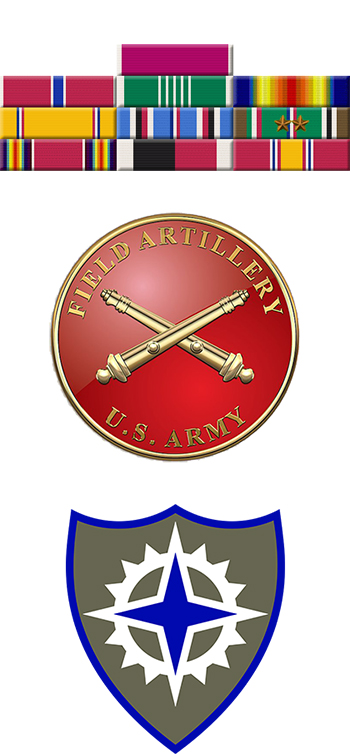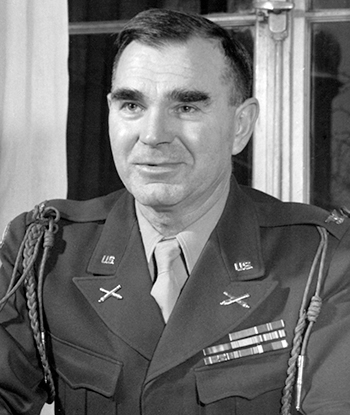
|
Charles W. Mays |
 |
|||
| Rank, Service | ||||
Colonel O-6, U.S. Army |
||||
| Veteran of: | ||||
|
||||
| Tribute: | ||||
Charles Mays was born on April 24, 1892, in Fort Worth, Texas. He entered Officer Candidate School at Fort Riley, Kansas, on May 14, 1917, and graduated and was commissioned a 2d Lt of Field Artillery on August 15, 1917. His first assignment was as a Line Officer with the 340th Field Artillery Regiment at Camp Funston, Kansas, from August 1917 to May 1918, and then with the 12th Battalion, Field Artillery Replacement Depot at Camp Jackson, South Carolina, from May to July 1918. Lt Mays attended the School of Fire at Fort Sill, Oklahoma, from August to October 1918, and he then served as a Reconnaissance & Observation Officer with the 50th Field Artillery Regiment at Fort Sill from November 1918 to February 1919. After attending the Field Artillery School at Camp Taylor, Kentucky, from February to April 1919, he served as a Line Officer with the 83rd Field Artillery Regiment at Fort Knox, Kentucky, from May 1919 to December 1920. Capt Mays' next assignment was as a Recruiter in Scranton and Erie, Pennsylvania, and then as an Intelligence and Plans Training Officer with the 3rd OTC between December 1920 and November 1921. He then served as Commander of Battery B, 13th Field Artillery Regiment at Schofield Barracks, Hawaii, from November 1921 to December 1924, followed by service with 2nd Battalion of the 4th Field Artillery Regiment at Fort McIntosh, Texas, from January to September 1925. He attended training at the Field Artillery School at Fort Sill from September 1925 to July 1926, and then served as an Instructor with the 131st Field Artillery Regiment of the Texas National Guard at Amarillo and then Corsicana, Texas, from July 1926 to August 1930. His next assignment was as an Instructor with the Army ROTC Detachment at Purdue University, in West Lafayette, Indiana, from August 1930 to August 1936, followed by service as Commander of Battery E, 15th Field Artillery Regiment, at Fort Sam Houston, Texas, from August 1936 to August 1938. Major Mays then served as an Instructor with the Texas National Guard at Corpus Christi and then Austin, Texas, from September 1938 to December 1940, and then served as a Battalion Commander with the Field Artillery Replacement Training Center at Fort Sill from December 1940 to December 1942. Col Mays' next assignment was as Executive Officer of the Field Artillery Replacement Training Center at Fort Sill from January to February 1943, followed by service as Commander of the Field Artillery Replacement Training Center at Fort Sill from February 1943 to January 1944. He took command of the 407th Field Artillery Group at Fort Benning, Georgia, and then at Camp Rucker, Alabama, from April to September 1944, and he then deployed with his group to Europe in October 1944, serving in combat through Northern Europe and into Germany until the war ended. Col Mays then took command of the 173rd Field Artillery Group, serving in Germany from July to September 1945, followed by service with Headquarters XV Corps Artillery in Germany from September 1945 to March 1946. He served as the Escort Guard Commander with Headquarters Third Army in Germany from March to April 1946, and then as Marshal of the Court for the First International Military Tribunal at Nuremberg, Germany, from April 1946 to September 1947. During this time he oversaw the first War Crimes Trials including the Doctor's Trials from December 1946 to August 1947. His final assignment was Senior Army Instructor to the Utah Army National Guard at Fort Douglas, Utah, from September 1948 until his retirement from the Army on July 1, 1952. Col Mays died on December 3, 1975, and was buried at Fort Sam Houston National Cemetery in San Antonio, Texas. |
||||
|
||||

